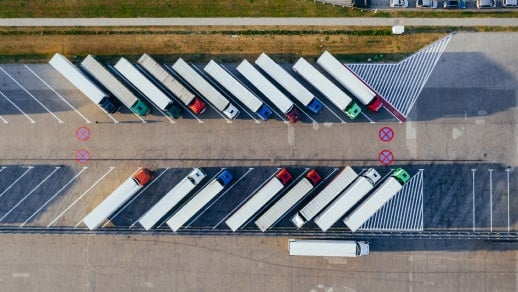Commercial Truck Insurance Requirements
Get ahead of commercial truck insurance requirements
Feel prepared for state and federal requirements, no matter which industry or area you work in.
Each state has its own commercial truck insurance requirements, and regulations can evolve over time. Additionally, federal requirements may introduce extra compliance steps for your business. Keeping up with these changes can be challenging—especially when you’d rather stay focused on your work and operations.
- Understand state-specific insurance needs
- Timely access to required documentation
- Coverage considerations for hazardous or specialty loads


Understand state-specific insurance needs
Stay compliant by learning what applies to your operation.
Insurance requirements vary depending on your state, industry, and type of load. They may also change over time, or differ if you begin hauling new types of cargo. Staying informed helps ensure your coverage matches the regulations that apply to you.
Timely access to required documentation
Know how to manage requests for proof of coverage.
Shippers, brokers, or regulators may request proof of insurance with little notice. Having a clear process for accessing and sharing your documentation helps you respond quickly and avoid delays.


Coverage considerations for hazardous or specialty loads
Learn how cargo type influences insurance requirements.
The type of freight you haul plays a major role in determining your insurance needs. Hazardous or specialty cargo often requires higher limits, while high-value goods like electronics or perishables may increase costs due to potential risks. Understanding these requirements in advance can help you plan more effectively.
The cost of your policy is influenced by a number of factors. This could include the type of freight you haul, how many trucks you have (and how expensive they are), your driving record (i.e. whether you’ve had accidents before), and what types of coverage you would like to buy.
One of the best ways to lower your premiums is by maintaining a strong safety record. Safe driving habits, regular vehicle maintenance, and proper training can all help reduce costs while keeping you and your business protected.
The first thing you should do after an accident is contact emergency services if necessary. If you are unhurt and able to do so, obtain the contact details of anyone else involved in the accident, and take photographs to document what happened. Get the contact details of witnesses who saw what happened. Report the incident to the police and your insurance as soon as possible.
Yes. Your insurance can be customized depending on what types of loads you haul. For example, if you haul specialty or hazardous cargo, your insurance premiums are likely to be higher, and you may need special types of coverage. Every business is unique, and your insurance must be customized to your specific situation.
The Federal Motor Carrier Safety Association (FMCSA) sets out regulations and rules for commercial motor vehicles, which includes trucks. FMCSA requires that you have coverage potentially up to $750,000 for non-hazardous materials, and up to $5 million if you are transporting hazardous materials.
Navigating commercial truck insurance requirements
Both federal and state regulations shape commercial truck insurance requirements, and they can vary widely based on your business and cargo. By staying informed about these rules, you can ensure compliance and avoid unexpected challenges.